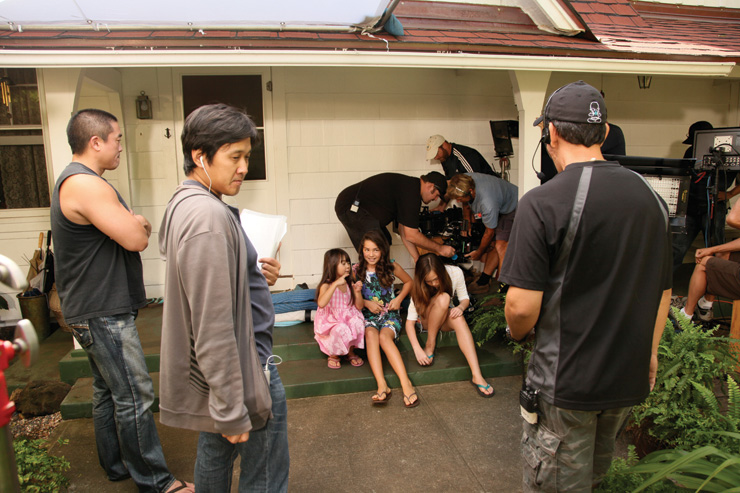The Tracks of the Bunny Monster
Los Angeles native Jennifer Lee, a.k.a. Tokimonsta, is already a star in the electronic music world. But will her mother believe it?
by Y. Peter Kang
It’s a windy day at the J.W. Marriott Hotel poolside lounge in downtown Los Angeles where electronic musician Jennifer Lee is performing an afternoon set. Lee, who goes by the nome de Tokimonsta, loops the first two notes of Jimi Hendrix’s “Purple Haze” and then lays down the guitar riff from Dr. Dre’s “Xplosive” with some classic James Brown added in for good measure.
“I like doing fun mash-ups of songs that I know people recognize,” she says.
A friend hands her a plastic cup filled with a shot of Jägermeister. She toasts, drinks, makes a Jägermeister face. All without missing a beat.
In a few short years, Lee has established herself as one of the premier experimental DJs and beatmakers in the world. She is a regular at Low End Theory, the vaunted monthly gathering in Los Angeles for experimental hip-hop and electronica artists. Lee’s remixes and performances have become staples for the electronic music industry press, and her gender has made her something of a darling in the male-dominated world of electronic music.
[ad#graphic-square]
Back at the Marriott, the Torrance, Calif., native is now pounding her APC Ableton MIDI controller—a button and knob-heavy piece of hardware about the size of a chessboard—sending bass-heavy beats pumping out of the massive speakers. The music segues into a loungy, breezy beat and just as quickly switches up again.

“I would say it’s like being a conductor of my own music and orchestrating things,” she said of her work, during an interview earlier in the hotel lobby. In the style of much Low End Theory work, her music pulls from existing samples and impromptu drum machine riffs to create stuttering, cinematic soundscapes that change from moment to moment. It’s an expansive genre where the musician has lots of room to play with mood and tempo, and it can be difficult to describe.
Perhaps in response to one too many journalists asking her to explain her style, she recently tweeted, “For your information, I have no idea what kind of music I make or how to describe it.”
Later, Lee, who describes herself as an “intergalactic kimchi squad leader” on her Twitter profile, makes eye contact with me and makes a drinking motion as if to say, “Did you get enough to drink?” Even during her set she is the quintessential host. Korean habits die hard.

Jennifer Lee grew up in a single-parent household in the South Bay area of Los Angeles and attended West High School in Torrance. Like many Korean American kids, Lee played classical piano for about 10 years. A self-described “sh-tty student,” Lee says she disliked playing an entire piece of music.
“I only liked playing some parts of songs,” she says. “I think of it as classical sampling.”
Even at that age, Lee was already performing under something like her current stage name. The tokki part of her name comes from her family nickname.
“When I was young I had big front teeth and big cheeks, and the only Korean song I knew how to sing was the santokki [mountain rabbit] song,” she explains.
Later, she used “Tokimonsta” as her handle for chatting with friends online.
“I decided to make that my artist name, not thinking that I would be picking that for my career name,” Lee explains. “I feel like it was kind of arbitrary in the beginning, but now, it has a lot of meaning, because you have the cute with a little bit of the scary … that kind of defines a lot of the music that I do today,” she said, cracking a little in her willingness to describe her style.
Lee’s path to musical stardom grew out of her seeming inability to hold down a 9-to-5. After receiving a degree in international studies at the University of California, Irvine, Lee took a job as a business development coordinator at a video game publisher—a glorified administrative assistant position, she says, but she enjoyed the work environment. Then, she was laid off.
[ad#300]
After six months of unemployment, she landed a job as a manager at a small advertising firm. Two months later she was laid off again. It may have been the best thing to happen to her.
Lee had viewed making electronic music as merely a hobby, but had been slowly developing a following in the underground hip-hop scene due to her lively performances at competitive beat battles in the L.A. area.
Her mother, though, had a difficult time understanding her daughter’s new career. Lee says it’s partially due to her age; now 69, Lee’s mother had her when she was 42.
“She didn’t understand the concept of independent music,” Lee explains. “She either thinks you’re a real big pop star like Bi [Rain]—like those gigantic, mega stars—or you’re playing at a karaoke bar as a piano bar player or something like that. So, when I used to say that I was going to do a show somewhere, she says, ‘What kind of place is this? Are you going to be around a bunch of drunk kids? No one’s going to pay attention to you.’”
But Lee persevered. “I asked [my family] for one year,” she says, “and within that one year, I was getting self-[sufficient]. I started getting music out. I had my music played in really good radio stations, especially in the U.K.—like the BBC, and here in L.A. on KCRW.”

Lee’s work attracted the notice of Low End Theory superstar Flying Lotus, a.k.a. Steven Ellison, and he signed her to his label Brainfeeder, making her the imprint’s first woman. She’s been touring the world nonstop, playing everything from intimate rooms to giant outdoor festivals like Coachella in California and the Electric Zoo music festival in New York City.
Still, Lee’s mother took a while to be proud of her, she says. “I have to be like, ‘Oh, look, mom, the L.A. Times wrote something.’ I wouldn’t do this to anyone else except her, to help her understand what I’m doing. Otherwise, she’d have no concept of anything I’m doing. She would think it’s something very temporary and not serious.”
Lee’s work is well enough now, though, that her mother might not need convincing for much longer.
“She has her friends that she goes to church with and she’ll say, ‘Oh, this lady’s son knows who you are and stuff.’ And I’d say, ‘Oh, wow, that’s cool.’ And she’d be like, ‘So, are you famous or something?’”
[ad#bottomad]
This article was published in the October 2011 issue of KoreAm. Subscribe today!










